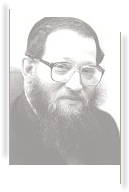Answer: Vatranut begins by seeing the other person as an extension of yourself. Parents instinctively do this with their children. You have to learn to bring more people into your picture. Being a shmatta means resentfully giving in when there are other possibilities. I would call this intentional martyrdom, which is what people
choose because they enjoy making others feel guilty and beholden. People with low self-esteem tend to give in, because they can't bring themselves to suffer even momentary disapproval from another person.
There is a huge difference when there are other alternatives and when you are giving in because of unhealthy reason. Martyrdom isn't good for anyone. The boundaries of vatranut have to do with halachic priorities. A mitzva comes before other obligations. Something only you can do comes before something other people can do.
For example, only you as your children's mother can put your kids to bed in a way that will make them feel loved and cared for. If someone consistently asks you to drive them somewhere at that hour, you have to learn to say no.
A definable mitzva cannot be forfeited at the risk of doing an aveira. For instance, if right before Shabbat a friend requests a favor that might cause you to violate Shabbat, you are obligated to decline. Obviously, real emergencies and saving lives take precedence over almost everything else.
Learn to use your good judgment and common sense. Giving in is laudable, but never at the expense of neglecting
your priorities.
Excerpted from Rebbetzin Tziporah Heller’s Question and Answer series on Naaleh.com
The Geulah Process Is Gaining Steam
-
*17 Nissan 5784Moadim l'simchah! *
[Please see my comments to the *previous blogpost*.]
Every media outlet in the world carried this headline yesterday: ...
50 minutes ago































































